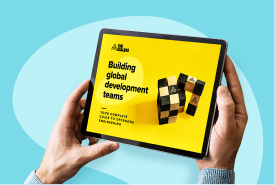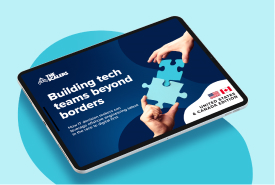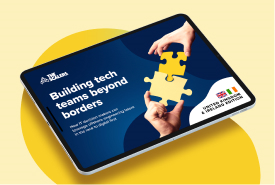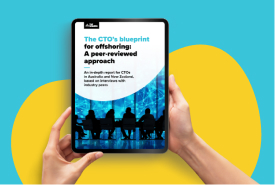This article was previously published for the Forbes Tech Council and was written by our CEO, Emilien Coquard.
Back in September, when I published an article about the connections between Hollywood and offshoring, AI tools weren’t accessible to the general public. Even I, as a tech enthusiast, couldn’t fully imagine the revolution about to begin.
On the morning of November 30, 2022, ChatGPT was released to the public. Across the globe, we all awoke to a paradigm shift in human-machine interaction that is transforming every industry, including tech. CTOs, engineering leaders, and business executives began asking how AI would impact their jobs and regular duties, myself included.
Does the rise of AI change the way we build teams as we know it? And as it’s a niche in which I’m operating – how will it affect offshoring and organizations relocating software development and tech operations overseas?
First, let’s tackle the biggest elephant in the room – will AI replace developers? Short answer, no. AI will automate tedious tasks and assist in generating code for software. Still, it won’t replace strategy planning, soft skills, and creative thinking.
The boom of AI applications in offshoring
Believe it or not, AI has been a topic of discussion since the 1950s, with the celebration of the Dartmouth Summer Research Project on Artificial Intelligence. That was when the term was coined and accepted as a field of research.
Today, AI has applications beyond imagination, from talent matching to data analytics tools that make tech leaders’ lives easier.
Intelligent talent matching
Companies that offshore tech are looking for talent they can’t find back home: engineers with niche programming skills and expertise working with international firms. There’s no doubt offshore partners can access a large talent pool, but identifying candidates with the necessary skills, experience, and cultural fit can still be challenging and time-consuming. I say that from personal experience.
That’s where AI comes in. AI algorithms have the power to analyze job requirements and candidate profiles to match talent to companies’ unique needs and requirements. See Paradox and Fetcher, two AI tools that help offshore recruiters manage repetitive tasks and find the best candidate for a company that wants to build a development team faster.
Virtual training and knowledge sharing
I can’t emphasize enough how important it’s to collaborate with your offshore team, from onboarding to training to day-to-day tasks. When you hire new engineers for your company, you want them to be productive and integrate them within your wider team as soon as possible, but you can’t achieve it without them learning internal best practices and workflows first.
AI training platforms are the present and future of virtual training and knowledge management, and I mean it. I’ve come across software, like NovoEd and Axonify, that allows tech companies to build personalized learning plans for new joiners and track their progress. What’s more, they analyze employee data to create learning paths adapted to each individual.
Enhanced cybersecurity measures
Tech leaders I speak to are mainly concerned with security and data privacy when moving operations overseas. I get where their concerns come from: cybersecurity threats are often seen as a con of offshoring. While this is not necessarily true, AI is set to secure offshore operations like never before.
AI is remarkably accurate in analyzing and protecting large amounts of data: gone are the days of tediously sifting through mountains of data and risking human error. Automated threat monitoring and response systems can help protect sensitive data and intellectual property.
The human touch: where AI falls short
AI capabilities never cease to amaze me, but I thrive on human interaction. I firmly believe AI is a game-changer for business in all industries, and it’s here to enhance people’s work, not replace talented and skilled professionals. Human intuition, experience, and creativity are still essential in specific offshore tasks.
Complex decision-making
AI has limitations, including how it handles complex strategic decisions, as an algorithm can’t rely on experience when making a critical business decision like a human.
Let’s put it this way. You’re a CTO with 10+ years of experience building offshore software development teams. Your organization is growing and requires more engineers to augment your existing team.
AI applications can help you analyze the risk of your investment. Still, you and your offshore partner are in a better position to consider factors such as cost-effectiveness, cultural compatibility, and legal and regulatory frameworks. Those 10+ years of experience in the industry are a key differentiator and the added value you have as a reputable tech leader vs. AI.
Building trust and relationships
The tech leaders I admire the most are not only very talented but also excellent communicators who care about building trust and meaningful relationships among their peers. These qualities are equally relevant when developing successful offshoring partnerships: human interactions and empathy are essential.
I’d like to highlight that these interactions are human, not AI-generated (and they’ll probably remain this way). AI systems have limitations in comprehending and responding to the complexities of human emotions and cultural nuances.
Adaptability to unforeseen challenges
AI may face limitations in adapting to unforeseen circumstances and rapidly changing requirements. See shifting market demands or regulatory and compliance updates.
That’s where the magic of human adaptability shines through. An experienced offshore partner can navigate the chaos with finesse, tackling unforeseen circumstances and requirements head-on. Only human-built teams can foster such a profound sense of assurance and confidence. At least for now.
Wrapping it up
Will AI ever overtake offshoring and make us useless? I’ll probably get that question innumerable times for years to come. No one knows how advanced AI will become, but my take is that offshoring is and will always be about people. Companies and offshore partners who build their businesses on a people-centered culture will thrive and harness AI’s power to maximize their capabilities. AI is here to stay, but the human touch remains invaluable in the context of offshoring and beyond.
Build Your Team,
Not Just a Contract
With The Scalers’ offshore dedicated development team, you get engineers who join your workflow for the long run. Grow steadily, stay flexible, and work with people who care about the product as much as you do.










